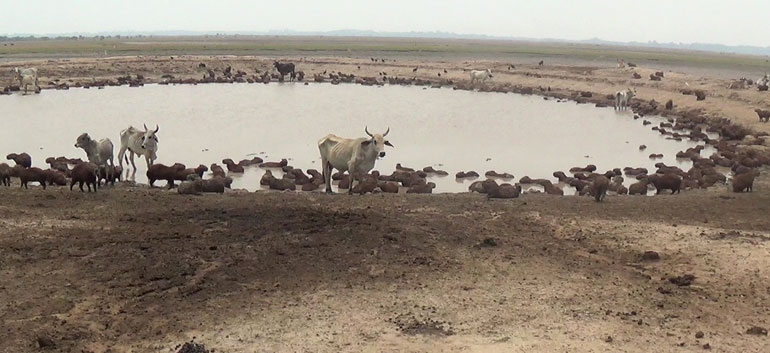Colombia’s government has called on its citizens to take emergency and preparatory measures in the face of a protracted drought affecting large areas of the country.
Last Friday, seven states were placed on high “red” alert due to the threat of acute water shortages and forest fires, including the northern Caribbean states of Cesar, La Guajira, Magdalena and Atlantico and Arauca, Casanare and Meta in the east. More recent warnings have expanded even further to include Choco and Cordoba in the northwest and north, respectively, and Santander in the east, according to Santa Fe.
MORE: 7 states on ‘red alert’ as Colombia drought crisis expands
Housing Minister Luis Felipe Henao has asked Colombians throughout the country to make a concerted effort to save water, and directed relevant municipal authorities and water providers to initiate emergency and contingency plans.
A recent report by the National Unit for Disaster Risk Management (UNGRD) highlighted 25 municipalities currently experiencing severe water shortages, less than half of which have adhered to established crisis protocol.
Emergency and contingency plans
“So far only 9 of these municipalities have activated their emergency and contingency plans. We stress the urgent need that the remaining 16 municipalities begin the process as soon as possible,” said Henao.
“We already have 570 emergency and contingency plans developed in the country which enable us to be prepared for possible shortages of drinking water, through tankers and other supply alternatives.”
In municipalities that have taken steps to adress the crisis, such as Santa Marta, a popular tourist destination along the Caribbean coast, reports have emerged of certain residents and businesses, including dry cleaners and farms, making illegal use of water, according to the minister.
Authorities predicted an extended drought last winter, but many state and local governments failed to implement adequate protections. In the central-eastern state of Casanare, where at least 20,000 animals have died due to dehydration, there has not been rain since last December.
MORE: Santos declares measures against devastating east Colombia drought
Elsewhere, in the Caribbean, rivers have reached “critical” levels throughout the region, posing the threat that communities not experiencing water shortages could soon be. Just hours after four Caribbean states were placed on high-alert, a wildfire broke out in the Sierra Nevada mountains, the tallest coastal range in the world and the focal point of one of the most bio-diverse areas in Colombia, that has since consumed over 3,000 acres of forest.
MORE: Sierra Nevada wildfire consumes 3K acres in northern Colombia
The minister of housing suggested 15 ways in which citizens could save water at home, some of which pertain to emergency situations and some of which are more generalized.
Government recommendations for saving water
- Examine taps, plumbing and piping in case of external leaks.
- Make use of systems for collecting rainwater in homes, which can be used for washing clothes, cleaning and sanitation.
- Only water plants and gardens twice a week, at night or early in the morning, preferably implementing drip irrigation systems.
- When washing dishes by hand, use a tub for washing and one for rinsing. Never leave the taps running.
- Take short showers and turn off the tap while applying soap.
- Use a glass of water to brush your teeth. Do not leave the tap open.
- Turn off water while shaving and use a container or plug the sink to shave.
- Wash vehicles at sites established for this purpose, if washing at home, use only a bucket of water.
- Teach children not to waste water.
- Periodically check that the toilets are functioning.
- Install low consumption toilets.
- Check the taps at least twice a year.
- Collect water from the shower while waiting for it to warm up in order to use it for plants or washing.
- Use the washing machine for full loads of laundry.
- Avoid using water hoses.



